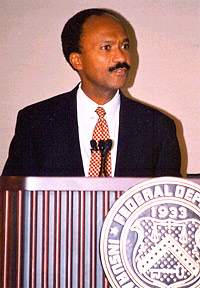Markets are touted as discounters. Buy on the rumor, sell on the fact stuff.
That the Federal Reserve is completely dumbfounded, despite its defenders, should no longer be debatable. Much of this week, as nearly everyone now knows, they have their minions, voting members and otherwise, appearing in public, softening up investors for future rate hikes.
The fix to make the dollar stronger is already in as an apparent deal's been struck to have America and it's historical consumer-crazy hordes bail out other economies. Under the guise that the world's largest economy is doing better than most after it's long drenching in free money from the Fed, we'll buy the rest of the globe's crap. That's what we're good at.
Problem is these bureaucrats apparently never heard of yin or yang. As noted in today's WSJ, their dollar index is up 3.2% so far this month. Like everything else, however, the dollar doesn't exist in a vacuum. If it's going up, something else must be going down. Like for starters emerging markets currencies as in the Mexican peso, 7.1%, the Turkish lira, 5.1% and the Colombian peso 6.8%, to name a few.
Then there's the yen and the yuan and a gaggle of commodities like copper, silver and gold. The S&P GSCI Industrial Metals index is off nearly 9% this month also since many commodities have to go through the dollar to trade. Why is this important? Well, it's hard to engineer a global recovery without some demand for basic stuff.
Long suffering emerging markets surprised many so-called pundits by starting off this year on the upswing only now since March when the dollar rally began to reverse course. Money of late is exiting emerging market funds like a band of Chinese investors were pulling capital out of their homeland earlier this year before government officials stepped up the penalties. But here's another view, one investors might find interesting from Deutsch Bank.
But the problem, according to
Deutsche Bank's global economics team, is that by preparing markets for
future interest rate hikes the Fed potentially hampers its ability to
actually carry out those hikes in the future. Said another way, the Fed
appears stuck in a negative feedback loop wherein suggestions that
higher rates are coming create the unsettled conditions that ultimately
force the Fed to keep rates right where they are.
And so on. Deutsche Bank's latest note looks
most closely at the Fed's relationship to financial conditions and
whether a tightening of these conditions — basically, interest rates
rising, credit issuance slowing — would prevent an interest rate hike. The short answer is maybe.
But in my view the main takeaway
from the report is that right now there are a number of tides the Fed is
swimming upstream against, making its prospects for carrying out future
rate hikes a potential challenge. Almost the least of which are how
tight financial conditions either are or are not.
 Deutsche Bank Financial conditions matter except when they don't, according to this chart.
Here's Deutsche Bank (emphasis added):
Deutsche Bank Financial conditions matter except when they don't, according to this chart.
Here's Deutsche Bank (emphasis added):
The
recent drumbeat of hawkish commentary from the Fed, along with last
week’s release of the minutes from the April FOMC meeting, has triggered
a sharp re-pricing of expectations for Fed rate hikes by the market. While
the market was only pricing about 4% odds of a rate increase in June
less than two weeks ago, those odds now stand close to one-third.
It is believed that this shift in rhetoric toward a more hawkish message will ultimately be self-defeating.
By signaling rate hikes, interest rates adjust higher, the dollar
strengthens, and risk assets may come under pressure. This produces
tighter financial conditions, which ultimately prevent, or at least
limit, the eventual rate increase. This natural tightening of financial
conditions in response to rate hikes is expected.
But there are reasons to believe that this negative feedback loop may be more severe in the current environment: a
stronger dollar is likely to increase pressure on China’s currency and
weigh on commodity prices, thereby re-introducing the key elements of
stress that led to a sharp tightening of financial conditions earlier
this year.
If this view is correct, the scope for further rate increases by the Fed is reduced.
So again, by saying higher rates are coming the Fed creates a sort of
chain reaction in financial markets that lead, among other things, to
tighter financial conditions, a strong dollar pressuring commodity
prices, and stock markets potentially getting rattled.
This is the thinking that undergirds the idea that the Fed can never really raise interest rates.
If you view the Fed's ultimate goal as raising interest rates from
current levels, this is a problem. But if you view the Fed's posturing
as merely that, well, none of this is really a surprise.
In the end, Deutsche Bank's conclusion is really just mealy-mouthed economist speak (again, emphasis mine):
The evolution of financial conditions will be critical for whether the Fed will be able to raise rates in the coming months. Our
analysis finds evidence that a negative feedback loop does exist
between the market’s expectations for the Fed and financial conditions.
However, we believe that, absent a shock from China in the months ahead –
which is clearly difficult to predict – it is unlikely that a negative
feedback loop that tightens financial conditions will prevent the Fed
from hiking.
Alternatively: here is a problem for the Fed, except right now it isn't a problem, unless it becomes a problem. So as tends to be the case with Fed-related forecasting, whatever you were already thinking can probably be justified.
It cuts both ways. So we will see.







